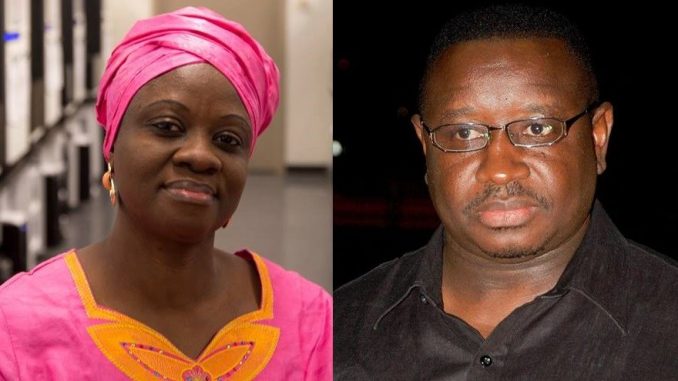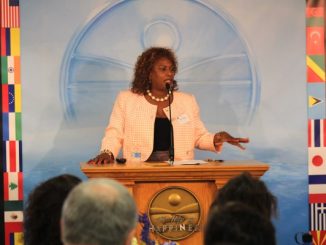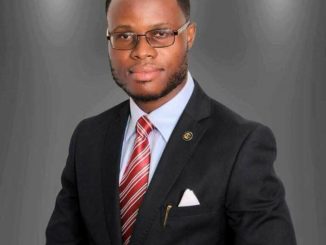

Dr. Sylvia Olayinka Blyden, former Social Welfare Minister who, during her tenure, was the only woman seated on the highest decision-making body for Sierra Leone security matters, the National Security Council, has expressed an observation that President Julius Maada Bio and certain officials of the current SLPP-led government might be “unknowingly making themselves to become future candidates for the International Criminal Court at The Hague”.
In a telephone chat with this newspaper from London, United Kingdom where she currently is, Blyden advised the President to “better study the transformation of the national security systems over the 22 years since he first briefly served as Head of State in 1996”.
“I might be wrong and I truly hope so but from my observations, the President and some on his team, might not yet be properly briefed on the architecture and legal framework of Sierra Leone’s national security systems and how they have evolved over time especially with who has responsibility to evoke certain operations,” Dr. Blyden stated.
Blyden spoke in the wake of the scandalous State-sanctioned raids on Temne villages in Yoni, Mile-91 in which a very large number of well-armed soldiers took part according to eye-witnesses including traditional leaders and the Police Commander for that area.
Dr. Blyden said Sierra Leoneans would never want to see a former Sierra Leone President sitting at The Hague, indicted for international crimes against humanity. She said this is why she is using this chance to publicly advise him in the wake of the recent raids on villages in Temne heartland by the Transnational Organised Crimes Unit (TOCU).
It can be recalled that the TOCU raids left egregious human rights abuses and infractions that were unforgivable including vandalizing of school buildings under the guise of searching for Marijuana supposedly grown on farms in those villages.
Blyden said the days when soldiers could be utilised recklessly without procedures and processes were long gone. Dr. Blyden further pondered whether President Bio has been properly briefed on how and when soldiers can be used to aid civil operations. As an example of her concerns in that direction, she said she has watched videos of soldiers in uniforms brutally manhandling youths during the monthly Cleaning Saturday exercises. She said the legal frameworks within which restrictions on movements were ordered are dubious but “worse of all, the use of soldiers to force citizens to clean the environs, greatly impugns efforts at security sector transformation.”
She said President Bio should not just take a cursory look at the security transformation but he should especially pay attention to “the remarkable work which had been done by former President Ernest Koroma in the last ten years of security sector reform”. She asked President Bio to better study MAC-P, MAC-A and MAGD alongside other new reforms instituted after the NPRC junta government.
She said the TOCU raid “was not a police affair” but a “national security affair which went above the mandate of the Inspector General of Police”. Dr. Blyden said people were “unfairly blaming the Inspector General of Police over the death and egregious infractions” when, according to her, “TOCU was formed in August 2010 under police supervision initially but since April 2014, it had been completely moved to become a sub-committee under the National Security Council at the Office of the President”.
She said she “and many others around the world” are currently quietly perusing how President Bio is handling the incidents at those Temne villages. She recalled how the presidency had published a document termed as GTT Report wherein Temne citizens were named and shamed because of their tribe and then later humiliated and/or sacked from their jobs by the Bio-led regime.
In the wake of the raids on Temne villages, Dr. Blyden is “strongly advising” the President to refrain from standing aloof and to make a more direct show of concern for those Temne villagers who got affected “especially the women and children”. She said this was needed from him not only as Father of the Nation but also considering the legal framework under which the TOCU/ONS operation was conducted. She advised him “most strongly” to better understand the legal issues around TOCU and ONS which were under his oversight since ONS is a part of the Office of President and TOCU is no longer under the Police but is a sub-committee of the National Security Council chaired by President Bio.
Blyden said when international tribunals hear matters, they also pay attention to unconstitutional and unlawful acts of those indicted for crimes against humanity. She said this was because leaders who act contrary to their nation’s constitution and laws, signaled their propensity to be human rights abusers.
She further advised the President that his advisers on the Public Service, Civil Service and the Constitution were doing him a dis-service. She said letters signed by Secretary to President directly appointing persons to take over civil service positions, whilst seemingly a mundane issue to some, were “not helpful” to him in the eventual future should he ever have to face a court over some of his actions.
Dr. Blyden further advised President Bio that the Supreme Court of Sierra Leone has never given any judgment upon which the President can cloak himself in powers to sack the Ombudsman and the Commissioner of the Anti Corruption Commission, amongst others.
She advised the President “to better read and understand the Supreme Court judgment in the Sam-Sumana matter”. She said contrary to what the Ministry of Information recently said, that Supreme Court judgment “merely endorsed that a vacancy had constitutionally occurred in the Office of the Vice-President when the Vice-President lost his membership in a political party.”
Blyden also said the reference by officials of Information Ministry to Section 61 of the Sierra Leone Constitution as giving a President powers to sack anyone in government was “one of the most comical statements I have ever read in my life”. She said it was not good to appoint persons who were “more fit to be clowns and entertainers as being the ones to explain legal issues to the public”. She advised the president to find better communicators for such delicate matters.



